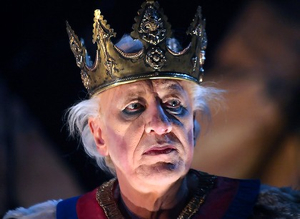Exit the King

Geoffrey Rush in Ionesco's Exit the King (2009)
Anyone wondering why artists represent themselves as kings – why Fouquet painted himself in 1450 as Charles VII or Ingres as Napoleon or even Lucian Freud as Queen Elizabeth II - might like to read Eugène Ionesco’s play, Exit the King. It does not take long except that….the last hour of the king’s life takes two. He knows he is going to die, and when he is going to die, so every excruciating minute is played out to the full. It was electrifying on stage with Geoffrey Rush in the lead role in 2009 but is a great read anyway.
Just as in poetic painting, the events on stage and the staging itself are fused. The audience becomes aware of both as King Berenger’s cold, unsympathetic Queen informs him: “You’re going to die in an hour and a half, you’re going to die at the end of this show.” The king, of course, is our own ego screaming not to die. Nevertheless, his Queen – our conscience or soul – scolds him for never having planned for this moment, for always trying to ignore and delay the inevitable: “He’s always lived from day to day like most people.”
When the king finally accepts his approaching death, he asks that everyone remember him: “Make everyone learn my life by heart. Let the schoolchildren and the scholars study nothing else, but me, my kingdom and my exploits.” And, then, in a striking echo of what artists do in paint and stone, he cries out: “Let my likeness be on all the ikons, me on the millions of crucifixes in all our churches. Make them say Mass for me and let me be the Host….Let them cry my name throughout eternity.”
Ionesco may or may not have understood visual art but his approach in this play is close to the great masters of painting and sculpture. (I will be showing in coming months how many of the great masters, besides Durer, portrayed themselves as Christ.) As in art, exterior events in Ionesco’s play are interior events; every character is an aspect of the playwright himself; the artist’s soul struggles for immortality. Yes, Ionesco was probably more cynical than most great masters, unwilling to accept that redemption might be within reach, but there is a lot in common….well worth reading.
Posted 09 Dec 2010: Artist as KingDurerFreud, LucianBooksReligionWriters
The EPPH Blog features issues and commentary.

Reader Comments